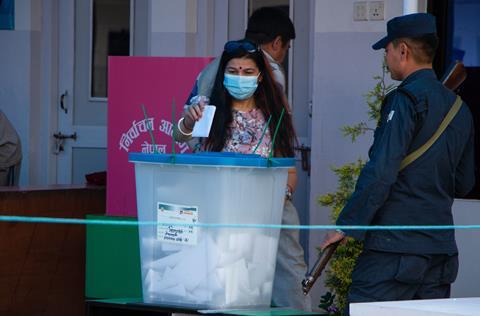At least 64 countries (plus the European Union) are holding national elections this year. That is 49% of the world’s population. Jenny Sanders asks how, in the global shift, we can respond as Christians.

‘Just because you do not take an interest in politics doesn’t mean politics won’t take an interest in you.’ - Pericles (495-429BC)
I wonder what this Athenian statesman would make of global governance today. Almost half of the world has elections this year, including the UK. We have the privilege and responsibility of considering where we will be placing our cross on the ballot paper.
Elsewhere, not everyone will get to cast a vote, have a choice of candidates, or be assured that their elections are ‘free and fair’. Nevertheless, the outcomes will affect 100% of people on the planet for at least the next five to ten years. Our collective experience will inevitably be shaped and coloured by what happens in 2024.
Taiwan have already elected their man – China does not approve. Indonesia appears to have chosen the former defence minister as the new president. In Pakistan, Imran Khan,’s party garnered most seats at national level despite the fact that he is currently in jail and was banned from politics for five years.
Some leaders could try the old trick of changing the law to ensure they secure another term.
Some leaders could try the old trick of changing the law to ensure they secure another term. Putin already did that in 2021, despite the fact that he’s held the office since 2012 – a period spanning five US presidents – thus circumventing the old rule of having no more than two consecutive six year terms.
There’s a lot of media noise from across the pond about the US election which most of us in the UK find baffling for a raft of reasons.
I’m writing this from South Africa where the most important elections since 1994 take place this year. Others will be taking place in Mexico, Brazil, Rwanda, Namibia, Canada, Australia and the European Union.
Bangladesh, India, Iran, Turkey and Mozambique have elections and are all on the Open Doors World Watch list. That means that they are in the top 50 countries of the world where Jesus followers experience the most persecution.
Bangladesh, India, Iran, Turkey, and Mozambique, have elections and are all on the Open Doors World Watch list. That means that they are in the top fifty countries of the world where Jesus followers experience the most persecution.
Will things get better or worse for them once the results are in? It’s hard to say, but the predictions aren’t positive. We know that however difficult it is for believers, it’s even more difficult for women in cultures where gender-based discrimination operates.
Of course, we are most interested in our own election that will be taking place, probably in May but possibly in October, in the UK. As the rest of Europe appears to be swinging right in their governments, here we are veering left. No doubt the mud-slinging will get into full swing soon.
Read more on politics
Standing up for faith in politics
Is there space for faith in politics?
Christians don’t have to avoid politics but here’s three things to help you debate in a Godly way
Whatever the outcome of our elections, we would be foolish to put our faith in any politician or political party. No policy that can save us from ourselves and you cannot legislate morality.
But there is hope: ‘…if my people, who are called by my name, will humble themselves and pray and seek my face and turn from their wicked ways, then I will hear from heaven, and I will forgive their sin and will heal their land.’ (2 Chronicles 7:14)
Whether you are interested in politics or not, the UK is known and loved by our faithful God. We have a responsibility to engage with what’s happening in our nation, and pray for it fervently, remembering that we are part of a bigger story, a wider Kingdom.
We need to keep our eyes fixed on Jesus and continue to be salt and light wherever God has placed us regardless of what happens in Westminster and beyond.




































No comments yet